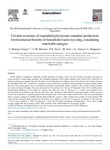Mostrar o rexistro simple do ítem
Circular Economy of Expanded Polystyrene Container Production: Environmental Benefits of Household Waste Recycling Considering Renewable Energies
| dc.contributor.author | Hidalgo, José | |
| dc.contributor.author | Moreira, César | |
| dc.contributor.author | Jervis, Freddy | |
| dc.contributor.author | Soto, Manuel | |
| dc.contributor.author | Amaya-Rivas, J. L. | |
| dc.contributor.author | Banguera, Leonardo | |
| dc.date.accessioned | 2022-05-06T12:31:32Z | |
| dc.date.available | 2022-05-06T12:31:32Z | |
| dc.date.issued | 2022-02-02 | |
| dc.identifier.citation | Hidalgo-Crespo, J., Moreira, C.M., Jervis, F.X., Soto, M., Amaya, J.L., Banguera, L., 2022. Circular economy of expanded polystyrene container production: Environmental benefits of household waste recycling considering renewable energies. Energy Reports 8, 306–311. https://doi.org/10.1016/j.egyr.2022.01.071 | es_ES |
| dc.identifier.issn | 2352-4847 | |
| dc.identifier.uri | http://hdl.handle.net/2183/30612 | |
| dc.description.abstract | [Abstract] Plastic industry is ubiquitous worldwide, and the generation of “plastic waste” has been steadily increasing to the point of being considered a high impact pollutant. The expanded polystyrene (EPS) plastic industry aware of the issue is interested on trying recycling post-consumer material. Through a recent study made in an alliance between the private sector and the academy, the feasibility of the EPS “mechanical” recycling was proven; therefore, a possible solution through a circular economy model. The aim of the present paper was to investigate the potential environmental impacts avoided by the circular economy scenario previously developed, through a life cycle assessment (LCA) performed for the city of Guayaquil, where 64% of all the plastic manufacturing industries in the country are located. The entire life cycle of 1.00 kg of 5 × 5 inch. food containers were assessed from the production stage until its end-of-life stage: focusing on three different valorization paths, circular economy closed-loop (container-to-container) proposal with electricity share of 2019 and another with the 2027 future one, and traditional linear economy (container-to-landfill). Results showed that the scenario C that considers the recycling of post-consumer EPS waste and the electricity share proposed for 2027 have lower impacts in 14 out of 16 categories, in specific for the Land use (−31%), Ozone Depletion (−28%), Acidification (−24%) and Terrestrial and Marine Eutrophication (−21%). These results strongly suggest that the recycling of these kind of plastic waste could benefit the environment greatly. | es_ES |
| dc.language.iso | eng | es_ES |
| dc.publisher | Elsevier | es_ES |
| dc.relation.uri | https://doi.org/10.1016/j.egyr.2022.01.071 | es_ES |
| dc.rights | Atribución-NoComercial-SinDerivadas 4.0 Internacional | es_ES |
| dc.rights.uri | http://creativecommons.org/licenses/by-nc-nd/4.0/ | * |
| dc.subject | Recycling | es_ES |
| dc.subject | Single-use plastics | es_ES |
| dc.subject | Expanded polystyrene (EPS) waste | es_ES |
| dc.subject | Circular economy | es_ES |
| dc.subject | Life cycle assessment (LCA) | es_ES |
| dc.subject | Renewables | es_ES |
| dc.title | Circular Economy of Expanded Polystyrene Container Production: Environmental Benefits of Household Waste Recycling Considering Renewable Energies | es_ES |
| dc.type | info:eu-repo/semantics/article | es_ES |
| dc.rights.access | info:eu-repo/semantics/openAccess | es_ES |
| UDC.journalTitle | Energy Reports | es_ES |
| UDC.volume | 8 | es_ES |
| UDC.issue | Supplement 3 | es_ES |
| UDC.startPage | 306 | es_ES |
| UDC.endPage | 311 | es_ES |
| dc.identifier.doi | 10.1016/j.egyr.2022.01.071 | |
| UDC.conferenceTitle | The 8th International Conference on Energy and Environment Research ICEER 2021, 13–17 September | es_ES |
Ficheiros no ítem
Este ítem aparece na(s) seguinte(s) colección(s)
-
GI-EnQA-Artigos [16]






